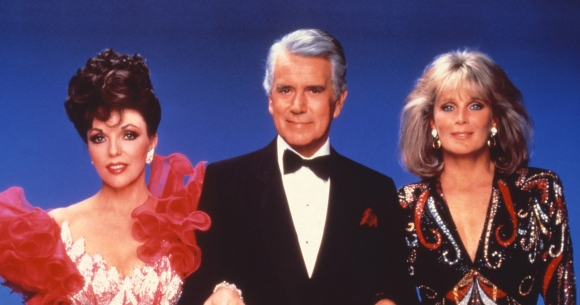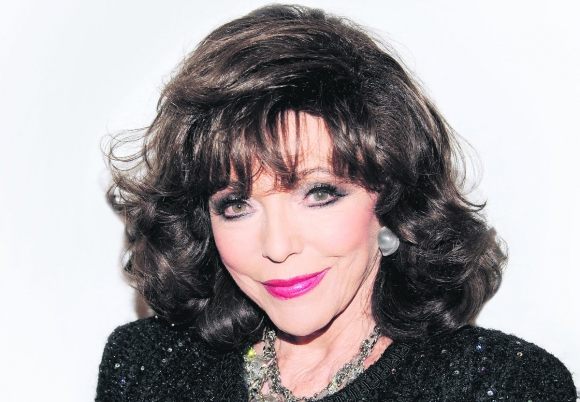Exclusive Content
–
The note you are trying to access is exclusively for subscribers
subscribe
know our plans
and enjoy El País without limits.
–
Get into
If you are already a subscriber you can
Sign in with your username and password.
–
–
“I’m not a bad girl,” she says Joan Collinssitting on a white sofa. “I was a very innocent girl. But she had dark hair and green eyes, and I guess they thought she was sexy.”
Collins, an actress whose career has oscillated between the sublime (land of pharaohs), the ridiculous (ant empire) and the sublimely ridiculous (Dynasty), wears white pants, an aquamarine blouse and white sneakers for the occasion. A pink diamond the size of a strawberry weighs on a finger; his hair rises to the sky.
Collins, 88, invited me to his home, offering me coffee, water, and a variety of high-end cookies, to talk about This Is Joan Collinsa biographical documentary.
What did it mean to look back on your life for the project? “I’m not very analytical,” she says languidly. “I only do one thing: I keep going.”
For the film, Collins gave the producers access to his archives and home movies. Otherwise, he limits his contribution. “I said, ‘Don’t put too many bare parts,’” she says. But she narrates the film. “Here I am,” she purrs in the opening moments, “after seven decades in the business, to tell you a thing or two about surviving the perils of the profession and what it feels like to really get what you want.”
Collins was born in 1933 and as a child, she lived in the London of the bombings, the evacuations, the dislocations that made her impatient with what she remembers as whining.

–
–
“I have to say that every time I read about an actor today, they’ve all been abused or had terrible childhoods,” he said. “I had a great childhood, apart from the war.”
At 17, he signed with a movie studio. She didn’t think she was glamorous. Not then. But the press disagreed, and she remembers some of the nicknames they gave her: Britain’s bad girl, the cafeteria vixen. She thus she was pigeonholed.
At first, it bothered him, he said, “then I just shrugged it off and moved on.”
When she was 21 years old, Fox hired her and she went to California. She was separated from her first husband, Maxwell Reed, an actor who had raped her on her first date, she says. As she wrote in her first memoir, Past Imperfect, and reiterates in the documentary, most men in the industry were predators.
In these early years, he developed a reputation for promiscuity, which was not entirely deserved, even as it became part of his fame. (An auction of her belongings in 2015 included not only love letters, but also the headboard of her bed.) “I had many boyfriends, but one after the other,” she says. “And I would sleep with some of them. Not at the same time. I was ahead of my time: women didn’t do that.”

–
–
At 30, she married actor-songwriter Anthony Newley and had two children. She later married music executive Ron Kass and had a daughter. Later, she had a fourth marriage, with the Swedish singer Peter Holm (“a total mistake”). She now lives with her fifth husband, theatrical producer Percy Gibson. He was the one who brought the water and took the cookies.
She was rarely able to escape typecasting, but she also shrugs off a conversation she had with actor John Gielgud, in which he told her that since she could never escape her physique, she could never play an ugly woman. “That was true for a number of years,” she said.
He does believe that good looks can be a deterrent to quality papers. “That’s why most actresses today try to look as ordinary as possible.”
In the late 1970s, she made a comeback with two softcore movies, Private Club Disco and The dog, adapted from novels by her sister, Jackie Collins. That exposure led to her most famous role, Alexis in Dynasty.
Despite the well-publicized struggles on set and the producers’ petty reaction to her demands for equal pay, she remains proud of Dynasty. Much of the memorabilia hanging in his apartment dates from that time.

–
–
–
“It was glamorous,” he said. “These were very, very rich people, most of them handsome.” He compares it to current success, Successionalthough, he clarifies, in Succession they wear more worn clothes.
Dynasty ended more than three decades ago. Collins hasn’t had a big role since. She thinks she knows why. “Casting directors say, ‘Oh no, we can’t use Joan Collins in this bitch role because it’s too obvious.’ And ‘Oh no, we can’t have her in this other role. She can only play femme fatale.’”
Still, he has continued, describing his glamorous life in the columns of the British weekly The Spectator, where Boris Johnson used to be his boss.
Collins hasn’t changed much. (Even her appearance has changed very little, although she claims to have tried Botox only once: “I screamed and came out of surgery.”) But she’s not sure if the entertainment industry has. “I won’t let men come on to me, so I don’t know,” she said. “But I think probably.” Still, in the wake of the #MeToo movement, she seems primarily concerned with men.
“Sadly, I think young men now suffer from being labeled toxicly masculine,” he says, “because of this rise in anti-masculinity.”
And yet, she identifies as a feminist. “I believe that women are equal to men in every way,” she says. “Except physical strength. People say that I didn’t burn the bodice and that I wear lipstick. AND? I am very proud to be a woman.”
–


